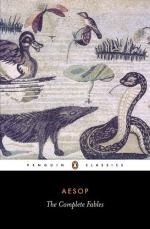What is worth most is often valued least.
THE DOG AND THE SHADOW
A Dog was crossing a plank bridge over a stream with a piece of meat in his mouth, when he happened to see his own reflection in the water. He thought it was another dog with a piece of meat twice as big; so he let go his own, and flew at the other dog to get the larger piece. But, of course, all that happened was that he got neither; for one was only a shadow, and the other was carried away by the current.
MERCURY AND THE TRADESMEN
When Jupiter was creating man, he told Mercury to make an infusion of lies, and to add a little of it to the other ingredients which went to the making of the Tradesmen. Mercury did so, and introduced an equal amount into each in turn—the tallow-chandler, and the greengrocer, and the haberdasher, and all, till he came to the horse-dealer, who was last on the list, when, finding that he had a quantity of the infusion still left, he put it all into him. This is why all Tradesmen lie more or less, but they none of them lie like a horse-dealer.
THE MICE AND THE WEASELS
There was war between the Mice and the Weasels, in which the Mice always got the worst of it, numbers of them being killed and eaten by the Weasels. So they called a council of war, in which an old Mouse got up and said, “It’s no wonder we are always beaten, for we have no generals to plan our battles and direct our movements in the field.” Acting on his advice, they chose the biggest Mice to be their leaders, and these, in order to be distinguished from the rank and file, provided themselves with helmets bearing large plumes of straw. They then led out the Mice to battle, confident of victory: but they were defeated as usual, and were soon scampering as fast as they could to their holes. All made their way to safety without difficulty except the leaders, who were so hampered by the badges of their rank that they could not get into their holes, and fell easy victims to their pursuers.
Greatness carries its own penalties.
THE PEACOCK AND JUNO
The Peacock was greatly discontented because he had not a beautiful voice like the nightingale, and he went and complained to Juno about it. “The nightingale’s song,” said he, “is the envy of all the birds; but whenever I utter a sound I become a laughing-stock.” The goddess tried to console him by saying, “You have not, it is true, the power of song, but then you far excel all the rest in beauty: your neck flashes like the emerald and your splendid tail is a marvel of gorgeous colour.” But the Peacock was not appeased. “What is the use,” said he, “of being beautiful, with a voice like mine?” Then Juno replied, with a shade of sternness in her tones, “Fate has allotted to all their destined gifts: to yourself beauty, to the eagle strength, to the nightingale song, and so on to all the rest in their degree; but you alone are dissatisfied with your portion. Make, then, no more complaints. For, if your present wish were granted, you would quickly find cause for fresh discontent.”




